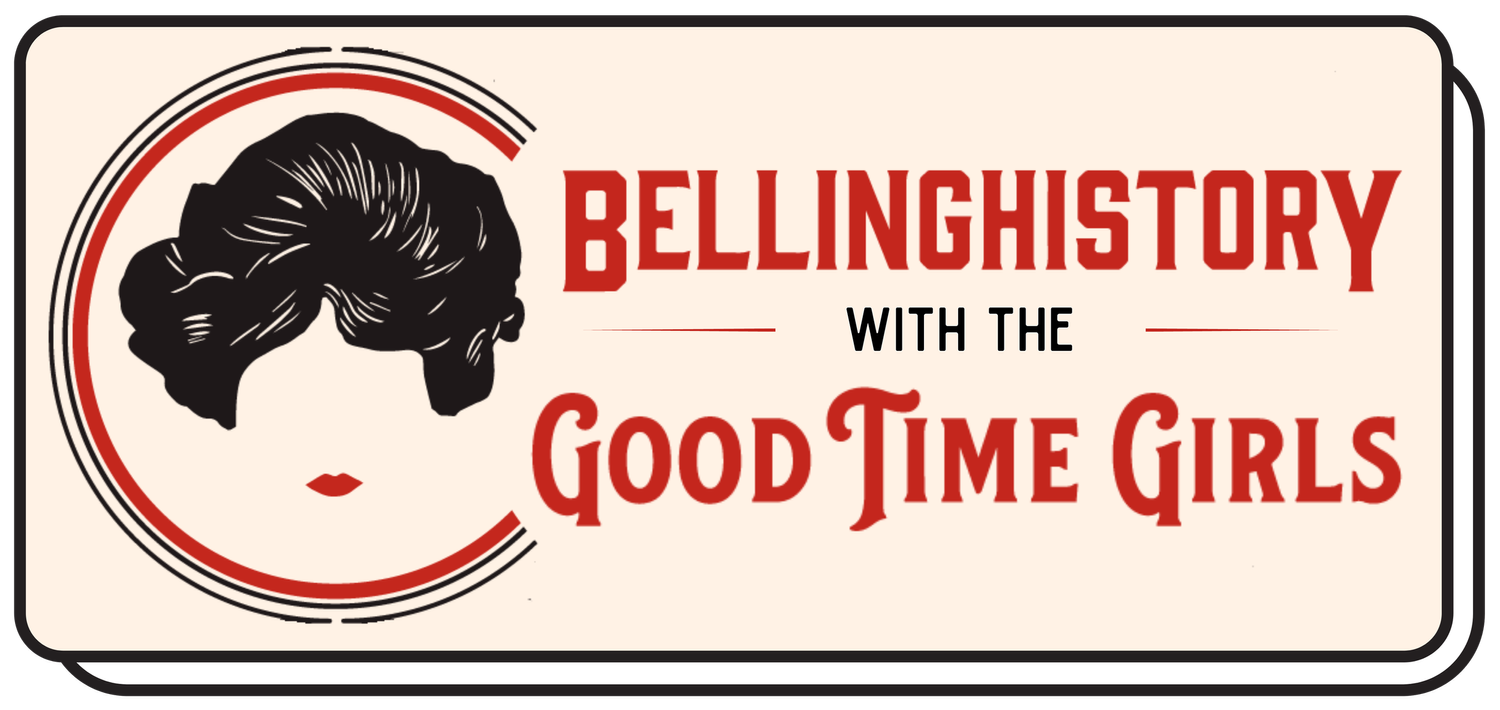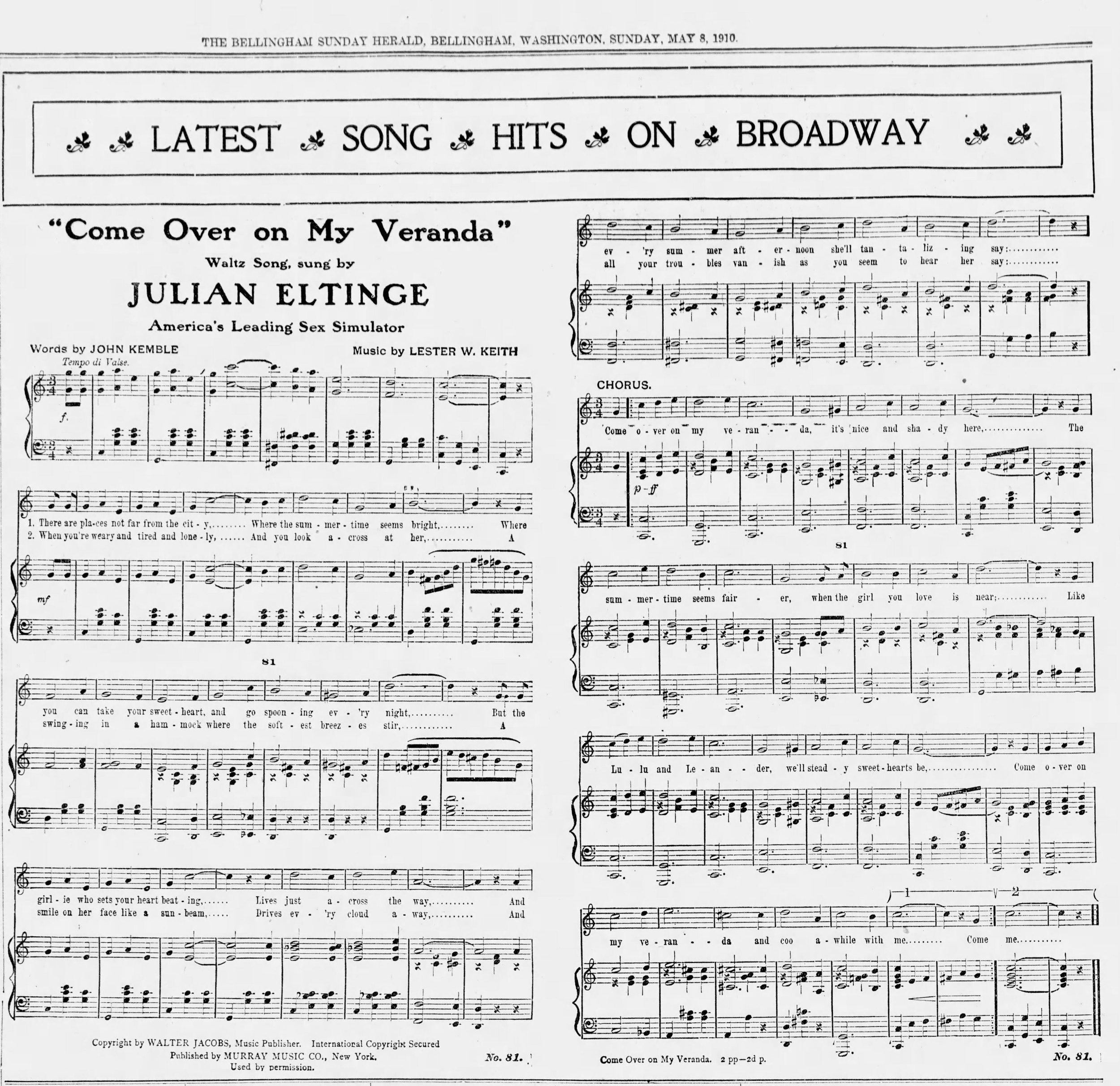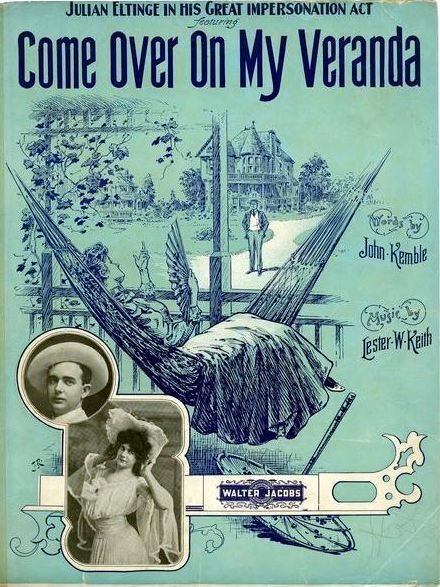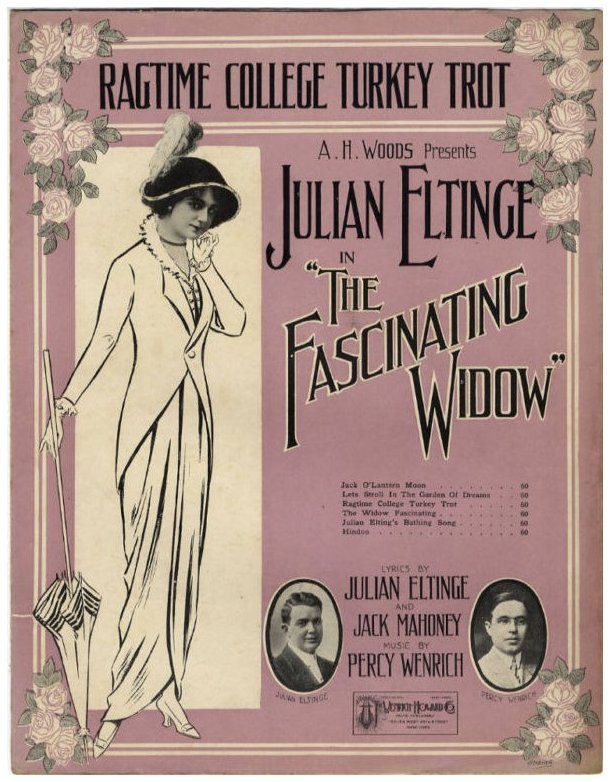Julian Eltinge: The Original Drag Superstar
The Original Drag Superstar Comes to Bellingham
This story is part of a series on “gender impersonators” on the early Vaudeville stages of Bellingham. Originally written and Published in the Betty Pages June 2023
In 1913 the Bellingham Herald announced: “Theater-goers have a treat in store next week when Julian Eltinge is scheduled to play at the Metropolitan Theater in his musical success, ‘The Fascinating Widow.’”
Often compared today to RuPaul of “Drag Race” fame, Julian Eltinge was the most famous female impersonator to grace Bellingham’s stages in the early 1900s. Herald newspaperman H.H. Matteson remarked “No actor on the American stage today is better liked or has a larger following than Julian Eltinge, the star of ‘The Fascinating Widow,’ who has attained his enviable position through his masterful and artistic portrayals of beautiful women.”
Born William Julian Dalton in 1881 in Massachusetts, as a young man his amateur stage performances attracted attention. Rising to stardom under the stage name Julian Eltinge, he became one of the highest paid performers in the country. The Eltinge Theater was dedicated in his honor on 42nd Street in Manhattan (now the AMC Empire).
In 1910 the Bellingham Herald printed several pieces of music made popular by “America’s Leading Sex Simulator.”
Written by Otto Hauerbach to showcase Eltinge, musical comedy “The Fascinating Widow” had debuted in 1910 in Atlantic City, New Jersey, toured the United States, and appeared on Broadway in 1911.
Bellingham folks would have had to travel to Seattle to see “The Fascinating Widow” on its first run. According to the Herald, “managers throughout the country wrote begging for one more appearance of the distinguished star in his inimitable role of the widow” and the 1913 Bellingham performance would be his last in that role.
Eltinge was booked at Bellingham’s largest theater, the Metropolitan (formerly Beck’s Theater and later known as the American Theater) on “Dock Street” (Cornwall Ave), with seating for over 2000. The show drew crowds with parties arriving from surrounding towns and counties to see the show. Society types held after-parties at the Leopold Hotel.
The Herald described the plot of the show: “Mr. Eltinge is first a college boy, and, in order to defeat the machinations of a woman who would marry his sweetheart to a bone-head rival, transmogrifies himself into the fascinating widow, enslaves all of the men in the cast, and thus works out the salvation of the situation by engaging himself, in the guise of a woman, to supplant his own sweetheart in the affections of the hated rival.”
Eltinge cultivated a masculine persona offstage, and onstage often appeared in both “feminine” and “masculine” attire, performing “quick-changes” that astonished audiences.
Matteson gushed, “Julian Eltinge, as the Fascinating Widow, is the most startling apotheosis, in his famous role, of any stage celebrity of the age. In the ordinary, he is a moderately well appearing young man; upon the boards, he is the most ravishing, bewilderingly beautiful woman that ever visited this city in a theatrical production.”
In 1990, Don Paulson, writer for the Seattle Gay News, interviewed Audrey Yentze who recalled seeing Julian Eltinge at the Moore Theater in Seattle:
“I was six years old when I saw Julian Eltinge in the musical revue, ‘The Fascinating Widow,’ where he sang and spoke and moved about the stage so elegantly and dressed in perfectly gorgeous costumes and jewels costing thousands. This I remember vividly. He was very dignified and carried an aura of complete control which captivated the audience. There was nothing about his performance that was unacceptable – even to the most pious people. He had poise and good theatership… His songs were absolutely discreet and on the order of love songs. Then at the end of his performance he removed his wig and the audience gasped… of course they knew he was a female impersonator, but it was so surprising because his body and his manners and acting ability was so feminine… This is what made it so charming to see this very gorgeous woman turn into a handsome man right before your eyes. It was an unbelievable transformation. There was a certain magic about it that pervaded his exciting and flawless performance, which got him a standing ovation and much applause. …It was very unusual then and even shocking, but it was an art form and Julian Eltinge certainly made it so.”
Eltinge made the leap to the silent screen, starring in many films including “The Clever Mrs. Carfax” which played at Bellingham’s Liberty Theater in 1918.
Eltinge endorsed various products including face creams, corsets and cigars. He built a stylish home in Los Angeles known as Villa Capistrano, which was featured on postcards and is recognized today by the Los Angeles Conservancy as a place of historic importance.
Eltinge cultivated a masculine “offstage” persona, and despite many publicized engagements, Eltinge never actually married and lived with his mother and his beloved bulldogs.
When anti-gay and cross-dressing sentiments swept the culture in the 1930s, Eltinge is said to have made public appearances standing onstage next to displays of the then-forbidden gowns he was once celebrated for wearing.
Eltinge died at age 59 in New York where hundreds of mourners attended his funeral.
One-hundred-and-ten years after Julian Eltinge’s Bellingham debut, we have an opportunity to hear the very same songs as performed by Bellingham’s Drag legend Betty Desire. Betty will be performing songs popularized by Eltinge at the climax of the BellingQueerstory Tours with the Good Time Girls (or Good Time Guides, if you will) - Sundays leading up to Bellingham Pride!
You can help support the Betty Pages by subscribing on Patreon here: https://www.patreon.com/TheBettyPages
For further information on Julian Eltinge See:
Julian Eltinge: Vaudeville's Most Famous Female Impersonator by David Soren
The King of (Drag) Queens: The “Fascinating” Julian Eltinge by Nicholas Beyelia
The Legacy Project: Julian Eltinge
Julian Eltinge Documentary Short
Female Impersonator Julian Eltinge Gets His Start in Boston’s Gay ‘90s















Percy teamed up with another female impersonator who went by Lou Lalonda. Percy and Lou were billed at Bellingham’s Grand Theater on Holly Street in September of 1905. At the time of their performance in Bellingham, papers described them as “two pretty young ladies who easily win applause.”